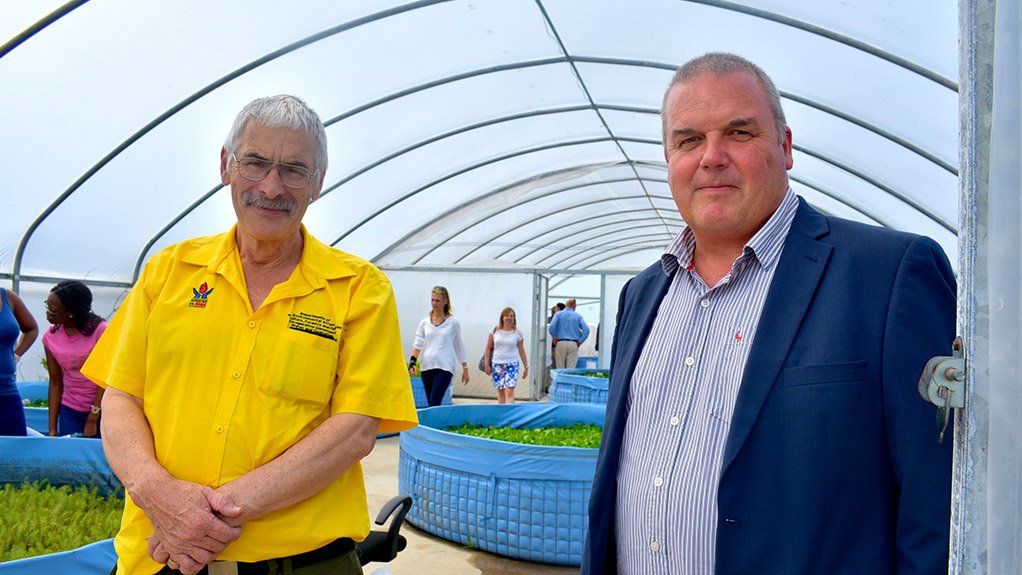Rhodes’ Centre for Biological Control awarded R68m contract to help control alien plants


DEA Deputy Director General Dr Guy Preston & Centre for Biological Control Director Professor Martin Hill
The newly-established Centre for Biological Control (CBC) at Rhodes University has been awarded a R68-million contract by the Department of Environmental Affairs (DEA).
This is one of the largest partnerships the university has secured to date and the biggest contract ever awarded to the science faculty.
The research focus of CBC is the sustainable control of invasive alien plants through biological control using insects.
The centre is also involved in the development of these agents in its Department of Agriculture, Forestry and Fisheries-approved quarantine facility, and the mass-rearing and implementation of the insects once they have been cleared for release.
Rhodes University research and development deputy vice-chancellor Dr Peter Clayton said the contract comes as a result of the university’s favourable history with the DEA and the high quality of work produced by the CBC in the areas of teaching, research and public engagement.
“This is the fourth contract secured with the DEA, which indicates confidence, trust and a sustainable relationship between the university and the DEA going forward.”
Rhodes University entomology head and CBC director Professor Martin Hill commented that the R68-million is being used for the research and implementation of biological control for 54 weed species in South Africa.
He explained how invasive alien plant species can have a drastically negative economic impact on land users and adverse effects on the country’s natural resources.
“Most of the invader plant species spread exponentially when there are no biological control interventions in place.
“Some of the plants we are targeting include invasive cacti species, which affect the drier regions in South Africa; water weeds, which affect most of the bodies of water in the country; and highland weeds, which affect our high-lying regions,” Hill pointed out.
The contract, which will run until March 2021, includes a consortium of universities from around the country, with regular inputs from the Agricultural Research Council.
The consortium is being led by Rhodes University and further comprises of representatives from the University of Cape Town, the University of KwaZulu-Natal and the University of the Witwatersrand.
Rhodes University was chosen to lead the project because of its CBC, which is considered the centre of excellence for biological control research in South Africa. All of the consortium members are experienced in biological weed control, with some 280 years of collective experience among the senior researchers.
The project aims to employ around 42 staff, from research officers to technicians, on fixed three-year contracts at the various institutions.
“Invasive plant species present a much bigger problem than people realise. With this project, we hope to spread not only our biological control agents, but awareness to all people in South Africa about the devastating effects the propagation of these non-indigenous plants has on the ecosystem and biodiversity of our country,” concluded Hill.
Comments
Press Office
Announcements
What's On
Subscribe to improve your user experience...
Option 1 (equivalent of R125 a month):
Receive a weekly copy of Creamer Media's Engineering News & Mining Weekly magazine
(print copy for those in South Africa and e-magazine for those outside of South Africa)
Receive daily email newsletters
Access to full search results
Access archive of magazine back copies
Access to Projects in Progress
Access to ONE Research Report of your choice in PDF format
Option 2 (equivalent of R375 a month):
All benefits from Option 1
PLUS
Access to Creamer Media's Research Channel Africa for ALL Research Reports, in PDF format, on various industrial and mining sectors
including Electricity; Water; Energy Transition; Hydrogen; Roads, Rail and Ports; Coal; Gold; Platinum; Battery Metals; etc.
Already a subscriber?
Forgotten your password?
Receive weekly copy of Creamer Media's Engineering News & Mining Weekly magazine (print copy for those in South Africa and e-magazine for those outside of South Africa)
➕
Recieve daily email newsletters
➕
Access to full search results
➕
Access archive of magazine back copies
➕
Access to Projects in Progress
➕
Access to ONE Research Report of your choice in PDF format
RESEARCH CHANNEL AFRICA
R4500 (equivalent of R375 a month)
SUBSCRIBEAll benefits from Option 1
➕
Access to Creamer Media's Research Channel Africa for ALL Research Reports on various industrial and mining sectors, in PDF format, including on:
Electricity
➕
Water
➕
Energy Transition
➕
Hydrogen
➕
Roads, Rail and Ports
➕
Coal
➕
Gold
➕
Platinum
➕
Battery Metals
➕
etc.
Receive all benefits from Option 1 or Option 2 delivered to numerous people at your company
➕
Multiple User names and Passwords for simultaneous log-ins
➕
Intranet integration access to all in your organisation



















